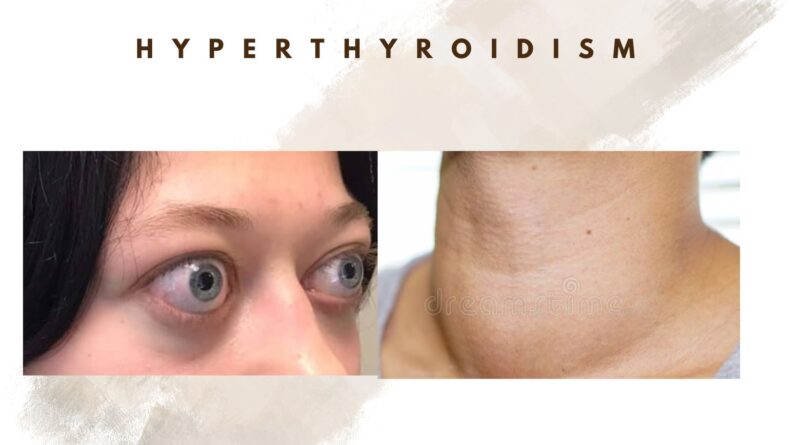5 Signs and Symptoms Of Hyperthyroidism – How to manage

Image source-FreePik
What Is Hyperthyroidism?
Hyperthyroidism is a medical condition characterized by an overactive thyroid gland, which results in an excess production of thyroid hormones. The thyroid gland is a butterfly-shaped gland located in the neck, which plays a critical role in regulating the body’s metabolism. When the thyroid gland produces too much thyroid hormone, it can lead to various symptoms, such as weight loss, increased heart rate, tremors, nervousness, and anxiety.
There are different causes of hyperthyroidism, including autoimmune disorders such as Graves’ disease or Hashimoto’s thyroiditis, thyroid nodules or goiters, inflammation of the thyroid gland, and certain medications. Treatment for hyperthyroidism depends on the underlying cause and severity of the condition. Common treatment options include medication, radioactive iodine therapy, and in some cases, surgery.
5 Signs and Symptoms Of Hyperthyroidism
Here are five common signs and symptoms of hyperthyroidism:
- Increased heart rate: A rapid heart rate or palpitations can be a sign of hyperthyroidism. The thyroid hormone affects the function of the heart and can cause it to beat faster.
- Weight loss: Hyperthyroidism can lead to unintended weight loss despite an increase in appetite. This is due to an increase in metabolism caused by the excess thyroid hormone.
- Nervousness and anxiety: An overactive thyroid can cause anxiety, irritability, nervousness, and restlessness. Patients may also experience difficulty sleeping.
Tremors: Patients with hyperthyroidism may experience tremors, particularly in the hands, which can be a result of the overstimulation of the nervous system.
- Heat intolerance: People with hyperthyroidism often feel hot or sweaty, even when others around them are comfortable. This is because the thyroid hormone regulates body temperature and an excess can cause the body to feel too warm.
Other symptoms of hyperthyroidism are:-
- Enlargement of the thyroid gland,
- Dry and brittle hair and nails,
- Muscular weakness,
- Digestive issues like indigestion, diarrhea, and abdominal pain.
What happens if you have hyperthyroidism?
If you have hyperthyroidism, your thyroid gland produces too much thyroid hormone, which can lead to a variety of symptoms and complications, including:
- Weight loss: Despite increased appetite, people with hyperthyroidism may experience unintended weight loss due to an increase in metabolism.
- Rapid heartbeat: The excess thyroid hormone can cause the heart to beat faster, leading to a rapid or irregular heartbeat, palpitations, or chest pain.
- Anxiety and nervousness: An overactive thyroid can cause anxiety, irritability, nervousness, and restlessness.
- Tremors: People with hyperthyroidism may experience tremors, particularly in the hands, which can be a result of the overstimulation of the nervous system.
- Heat intolerance: People with hyperthyroidism may feel hot or sweaty, even when others around them are comfortable.
- Fatigue: Despite increased metabolism, people with hyperthyroidism may also feel tired or weak.
- Sleep disturbances: Hyperthyroidism can disrupt sleep patterns, making it difficult to fall asleep or stay asleep.
- Eye problems: In some cases, hyperthyroidism can cause eye problems, such as bulging eyes, dry eyes, or double vision.
- Osteoporosis: Over time, untreated hyperthyroidism can lead to weak bones and osteoporosis.
Thyroid storm: In rare cases, hyperthyroidism can lead to a life-threatening condition called thyroid storm, which can cause fever, rapid heartbeat, confusion, and other serious symptoms.
What are the investigations done for diagnosis of hyperthyroidism?
There are several investigations that can be performed to diagnose hyperthyroidism and determine the underlying cause. Here are some of the common investigations for hyperthyroidism:
Blood tests: A blood test can measure the levels of thyroid hormones in the blood, including T3, T4, and thyroid-stimulating hormone (TSH). Elevated levels of T3 and T4 with low TSH levels suggest hyperthyroidism.
- Thyroid scan: A thyroid scan can help identify nodules or areas of the thyroid gland that are overactive. During a thyroid scan, a small amount of radioactive material is injected into the bloodstream, and a special camera is used to take images of the thyroid gland.
- Radioactive iodine uptake test: This test measures how much radioactive iodine is taken up by the thyroid gland. An overactive thyroid gland will take up more radioactive iodine than a normal thyroid gland.
- Ultrasound: An ultrasound can be used to evaluate the size and shape of the thyroid gland, as well as identify any nodules or other abnormalities.
- Fine-needle aspiration biopsy: If a nodule is identified on an ultrasound, a fine needle aspiration biopsy may be performed to collect a small sample of cells for further testing.
Antithyroid antibody tests: These blood tests can help identify autoimmune disorders, such as Graves’ disease, that may be causing hyperthyroidism.
These investigations can help diagnose hyperthyroidism and determine the underlying cause, which can guide treatment decisions. Your doctor may also perform other tests or evaluations as needed based on your individual case.
What is Graves’ Disease?

Graves’ disease is an autoimmune disorder that causes hyperthyroidism, which means the thyroid gland produces too much thyroid hormone. In Graves’ disease, the immune system produces antibodies that stimulate the thyroid gland, causing it to produce excess thyroid hormone.
Graves’ disease is the most common cause of hyperthyroidism, particularly in women. The exact cause of Graves’ disease is unknown, but it is believed to be a combination of genetic and environmental factors.
Some common signs and symptoms of Graves’ disease include
- an enlarged thyroid gland (goiter),
- weight loss,
- increased appetite,
- heat intolerance,
- nervousness,
- tremors,
- rapid heartbeat, and
- eye problems, such as bulging eyes, double vision, or dry eyes.
- Graves’ disease can also cause skin changes, such as redness and swelling on the shins.
Treatment for Graves’ disease may include medication to control the production of thyroid hormones, radioactive iodine therapy, or surgery to remove the thyroid gland. Eye problems associated with Graves’ disease may require additional treatment, such as eye drops, steroids, or surgery.
Is hyperthyroidism very serious?
Hyperthyroidism can be a serious condition if left untreated or if not managed appropriately. The excess thyroid hormone can affect many different parts of the body, leading to a range of symptoms and complications.
If left untreated, hyperthyroidism can lead to heart problems, such as rapid or irregular heartbeat, high blood pressure, or heart failure. It can also cause osteoporosis, which is a condition where the bones become weak and brittle, increasing the risk of fractures. In rare cases, untreated hyperthyroidism can lead to a life-threatening condition called thyroid storm, which can cause fever, rapid heartbeat, confusion, and other serious symptoms.
However, with proper diagnosis and treatment, most people with hyperthyroidism can effectively manage their condition and prevent complications. Treatment options include medication to control the production of thyroid hormones, radioactive iodine therapy, or surgery to remove the thyroid gland. Your doctor can help determine the best course of treatment based on your individual case. Regular monitoring and follow-up with your healthcare provider is important to ensure that your condition is properly managed
How can I reduce hyperthyroidism?
Hyperthyroidism can be effectively managed with appropriate treatment prescribed by a healthcare provider. Here are some steps you can take to reduce hyperthyroidism:
Take medications as prescribed: Anti-thyroid medications such as methimazole and propylthiouracil can reduce the production of thyroid hormone in the body. It is important to take these medications exactly as prescribed by your healthcare provider.
Consider radioactive iodine therapy: This treatment involves taking a capsule or liquid that contains radioactive iodine, which is taken up by the thyroid gland and helps to reduce the production of thyroid hormone. The radioactive iodine is eliminated from the body over time.
Surgery: Removing the thyroid gland (thyroidectomy) is another option for treating hyperthyroidism. This may be recommended if medications or radioactive iodine therapy are not effective, or if there are other concerns such as a large goiter.
Manage stress: Stress can exacerbate hyperthyroidism, so it’s important to find ways to manage stress, such as through exercise, relaxation techniques, or counseling.
Avoid iodine-rich foods: Consuming foods that are high in iodine, such as seaweed, can exacerbate hyperthyroidism. Limiting iodine intake can help reduce symptoms.
Follow a healthy diet: Eating a healthy, balanced diet can help support overall health and reduce inflammation in the body, which can be beneficial for managing hyperthyroidism
Who is at risk for hyperthyroidism?
Hyperthyroidism can affect anyone, but certain factors may increase the risk of developing the condition. Here are some common risk factors:
- Gender: Hyperthyroidism is more common in women than men.
- Age: The risk of hyperthyroidism increases with age, particularly for women over the age of 60.
- Family history: If there is a history of thyroid problems in your family, you may be at an increased risk of developing hyperthyroidism.
- Autoimmune disorders: Certain autoimmune disorders, such as type 1 diabetes, celiac disease, and rheumatoid arthritis, are associated with an increased risk of hyperthyroidism.
- Previous thyroid problems: If you have had thyroid problems in the past, such as thyroiditis, you may be at an increased risk of developing hyperthyroidism.
- Radiation exposure: Exposure to radiation, particularly in childhood, may increase the risk of developing hyperthyroidism.
- Iodine intake: Consuming too much iodine, either through diet or supplements, may increase the risk of hyperthyroidism.
It is important to note that having one or more of these risk factors does not necessarily mean that you will develop hyperthyroidism. However, if you are at an increased risk, it’s a good idea to be aware of the symptoms of hyperthyroidism and to talk to your healthcare provider about monitoring your thyroid function.
What are the medications used to treat Hyperthyroidism?
There are several medications that can be used to treat hyperthyroidism, including:
- Anti-thyroid medications: These medications, such as methimazole and propylthiouracil, work by blocking the production of thyroid hormones. They are usually taken for 12-18 months and can be used to achieve remission of the hyperthyroidism.
- Beta-blockers: These medications, such as propranolol and atenolol, are used to manage symptoms such as rapid heartbeat, anxiety, and tremors. They do not treat the underlying cause of hyperthyroidism, but can provide relief from some of the symptoms.
- Radioactive iodine therapy: This treatment involves taking a capsule or liquid that contains radioactive iodine, which is taken up by the thyroid gland and helps to reduce the production of thyroid hormone. It can cause hypothyroidism as a side effect.
Surgery: Removing the thyroid gland (thyroidectomy) is another option for treating hyperthyroidism. This may be recommended if medications or radioactive iodine therapy are not effective, or if there are other concerns such as a large goiter.
The choice of medication will depend on several factors, including the severity of the hyperthyroidism, the cause of the condition, and the individual’s overall health.
As for the aftereffects, the medications used to treat hyperthyroidism may have side effects. Anti-thyroid medications can cause skin rashes, nausea, and a decrease in white blood cells, while beta-blockers can cause fatigue and dizziness. Radioactive iodine therapy can cause hypothyroidism, which is a condition where the thyroid gland produces too little thyroid hormone. Hypothyroidism can cause symptoms such as fatigue, weight gain, and dry skin. Surgery to remove the thyroid gland carries the risk of complications such as damage to the vocal cords or the parathyroid glands.
Conclusion:-
Hyperthyroidism is a condition where the thyroid gland produces too much thyroid hormone, leading to a range of symptoms such as weight loss, rapid heartbeat, and anxiety. There are several factors that can increase the risk of developing hyperthyroidism, including age, gender, family history, and exposure to radiation. The condition can be treated with medications such as anti-thyroid drugs and beta-blockers, as well as with radioactive iodine therapy or surgery in some cases. While these treatments can be effective in managing hyperthyroidism, they can also have side effects and risks, and it is important to discuss the options with a healthcare provider. With proper treatment and management, many people with hyperthyroidism can achieve good outcomes and lead healthy lives.




